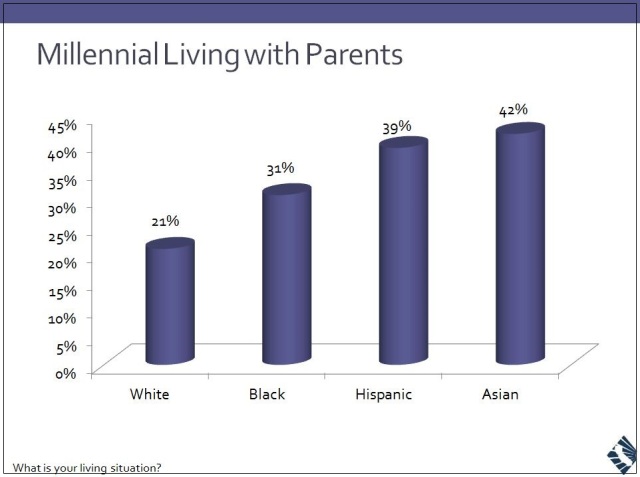Being a member of the California Association of Realtors (CAR), I have access to tons of information and great articles. I came across this read about millennials and found the statistics interesting so I thought I’d share it with you guys for this week’s post. My dad has always called us “the boomerang generation” because they threw us out to college but then we came right back after graduation 😛 I like to blame this epidemic on the recession and the lack of jobs and opportunity when I graduated back in 2007. But taking a look at where we are now, we will soon be dominating the housing market, if we aren’t already.
Why are millennials delaying marriage, having children and forming their own households?
Article by: Carmen Hiciag
Millennials, Gen Y or Echo Boomers are those born between the early 1980’s and early 2000’s or late 1990’s. Over 80 million strong, Gen Y is a force to be reckoned with as the second largest generation behind the Baby Boomers, making up nearly 28 percent of the U.S. population. In California, they comprise over 29 percent of the population—more than 11 million people, according to the Census Bureau. Millennials have not known a world without computers and are hence known as “digital natives.” Many of this generation feel that texting is just as meaningful as a phone conversation (Abraham, 2011) and they send about 20 texts per day (Pew Research Center, 2010). Three out of four Echo Boomers have created a profile on a social networking site and one in five has posted a video of themselves online. (Generation Waking Up) Technology is nearly as ubiquitous as oxygen in the lives of Gen Y; 80 percent sleep with their phones next to their beds (US Chamber of Commerce Foundation, 2012) and 56 percent believe technology helps people use their time more efficiently (Pew Research Center, 2010). This generation is known for delaying marriage and also for postponing having children; the majority are not married and nearly half do not have children. While income limitations contribute to this delay in settling down and having a family, another overlooked factor that is also contributing is ethnic background.
The 2014 California Association of REALTORS® Millennials Survey looked at those born between 1980 and 1996, or 18 to 34 year olds, who currently live in California. The Survey focused on renters and home owners and found that one in five are homeowners, 41 percent are renters and 36 percent live with their parents. When looking specifically at 18-26 year olds, the Survey revealed that nearly half (49 percent) live with their parents. Why do so many of this generation live with their parents? The obvious reason is budget constraints, and the C.A.R. Survey results reflected this.
Despite being well educated–46 percent of 27 to 34 year olds have a college degree and 42 percent of 18 to 26 year olds are currently enrolled in a college—Gen Y earnings and employment have some catching up to do. Only about half of echo boomers are currently employed, and only one-third have a full time job; 19 percent have a part time job, 24 percent are students and 20 percent are unemployed. This bleak employment situation translates to a median annual income of $35,000. Low annual wages are a major hindrance in this generation’s ability to purchase a home. However, there is a silver lining for earnings: older millennials (those between 27 and 34 years old) have a median annual household income of $50,000, compared to $30,000 for their younger cohort (18 to 26 year olds). So there is hope yet…while they may not have a high income now, their earnings will increase as they advance in their careers.
The not-so-obvious factor in millennials delaying adulthood is demographics. Millennials are very diverse—62 percent are minorities. It is not uncommon in ethnic minority or immigrant households for children to live with their parents, and in some instances even their grandparents, early into adulthood or after having children. Family bonds are very strong in culturally diverse households. The family is viewed as a unit, with everyone in the household pitching in to do their part and help the unit prosper. Parents help their children and the children, in turn, help their parents (and grandparents). The trend of more minority Echo Boomers living at home than whites is apparent in the Survey results, with twice as many Asians and Hispanics than whites living with their parents.

See more at: http://apps2.car.org/socialblogs/2014/12/2505/#sthash.CQD0Gca6.dpuf




